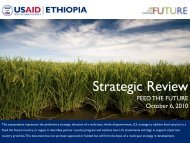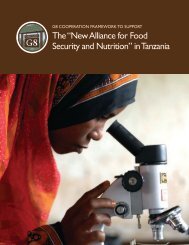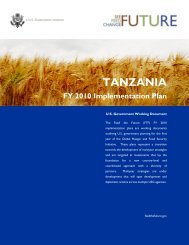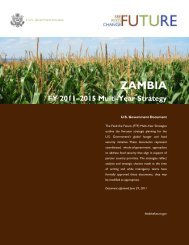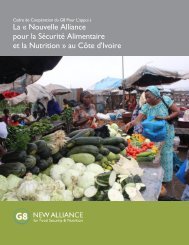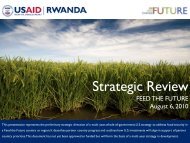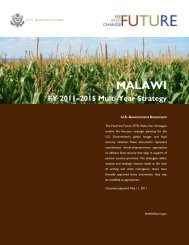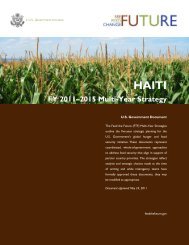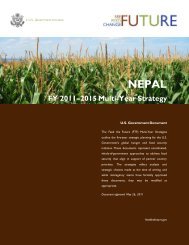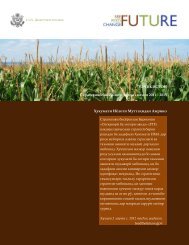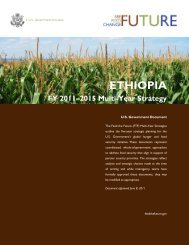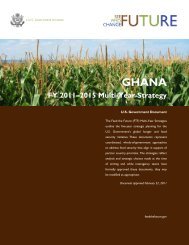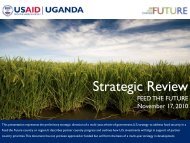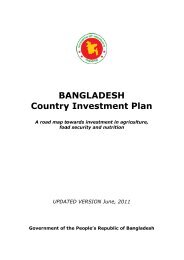Feed the Future Multi-Year Strategy, Senegal, Public
Feed the Future Multi-Year Strategy, Senegal, Public
Feed the Future Multi-Year Strategy, Senegal, Public
Create successful ePaper yourself
Turn your PDF publications into a flip-book with our unique Google optimized e-Paper software.
U.S. Department of Agriculture (USDA): USDA provides technical assistance and training that result<br />
in improved market access by creating sound border regulations and developing improved<br />
domestic, regional and international trade in staple food, livestock, poultry and fishery products<br />
via numerous forums, including <strong>the</strong> Cochran and Borlaug programs. USDA also provides<br />
agricultural commodities for monetization and contributes to nutrition enhancement<br />
programming. USDA’s contributions to <strong>Senegal</strong>’s FTF currently are in <strong>the</strong> areas of agricultural<br />
and market information systems, monitoring and evaluation, and training. Through a separate<br />
mechanism, USG/<strong>Senegal</strong> and <strong>the</strong> region benefit from direct USDA/Washington, D.C.<br />
agreements, in specific Participating Agency Service Agreements with USDA, to provide<br />
specialized expertise for FTF planning and implementation.<br />
Peace Corps: The Peace Corps provides rural technical assistance and expertise, as well as<br />
informal monitoring and evaluation. Volunteers currently work in private sector, agriculture and<br />
natural resource management, teaching, and health and nutrition, and can be fur<strong>the</strong>r linked into<br />
<strong>the</strong> value chain programs via small project grants in such areas as training and technical<br />
assistance. Volunteers also act as observers measuring <strong>the</strong> impact of <strong>the</strong> policy reform efforts.<br />
Peace Corps recently assigned a liaison to USAID/<strong>Senegal</strong>’s agriculture programming. This<br />
relationship helps <strong>the</strong> USG reach <strong>the</strong> micro producers and processors that might o<strong>the</strong>rwise be<br />
difficult to reach and will help spread project resources more efficiently.<br />
O<strong>the</strong>r USAID programs: There are multiple synergies between <strong>the</strong> FTF program and<br />
USAID/<strong>Senegal</strong>’s o<strong>the</strong>r programs in economic growth (EG), education (ED), democracy and<br />
governance (DG), and health. USAID/EG programs will complement FTF by broadly supporting<br />
<strong>Senegal</strong>’s business and competitiveness environment which is critical if <strong>the</strong> FTF initiative is to<br />
achieve truly sustainable results. Agricultural biodiversity is proven to play a critical role to<br />
maintain and improve food security, and enhance resilience to climate change, pests, diseases,<br />
nutritional deficiencies and o<strong>the</strong>r threats. Specifically, USAID biodiversity programs will support<br />
<strong>the</strong> local management of <strong>Senegal</strong>’s sou<strong>the</strong>rn forests, in part by helping communities harvest<br />
forest products sustainably yet profitably.<br />
Child survival and health, nutrition, malaria, maternal and child health, HIV/AIDS and tuberculosis funds<br />
will leverage FTF value chain extension and improve <strong>the</strong> access to, and quality of a comprehensive<br />
package of health services through work at <strong>the</strong> policy, clinical, and community levels. Agriculture value<br />
chain activities mesh well with nutrition objectives to take advantage of geographical concentration and<br />
optimize resource use.<br />
USAID Democracy and Governance experts and programs will provide support to FTF and <strong>the</strong> o<strong>the</strong>r<br />
sectors for improving transparency, accountability, and governance at both <strong>the</strong> national and local levels<br />
as well as providing support in <strong>Senegal</strong> for fiscal decentralization. These efforts are expected to improve<br />
<strong>the</strong> degree to which public resources contribute to poverty reduction, increase funding available to local<br />
governments to implement <strong>the</strong>ir responsibilities, and improve <strong>the</strong> extent to which citizen participation in<br />
government is increased. It will also streng<strong>the</strong>n decentralized service delivery in <strong>the</strong> education, health<br />
and natural resources management sectors.<br />
USAID/<strong>Senegal</strong> will also support institutions of higher education through universities and research<br />
centers engaged in agricultural training. This effort will provide a sustainable basis to develop <strong>the</strong> human<br />
and institutional capacity for continuous innovation and improvement in <strong>Senegal</strong>ese agriculture in both<br />
<strong>the</strong> public and private sectors and is expected to support positive improvements in farming systems,<br />
agri-businesses, community efforts, value chain productivity, and production system sustainability.<br />
15



